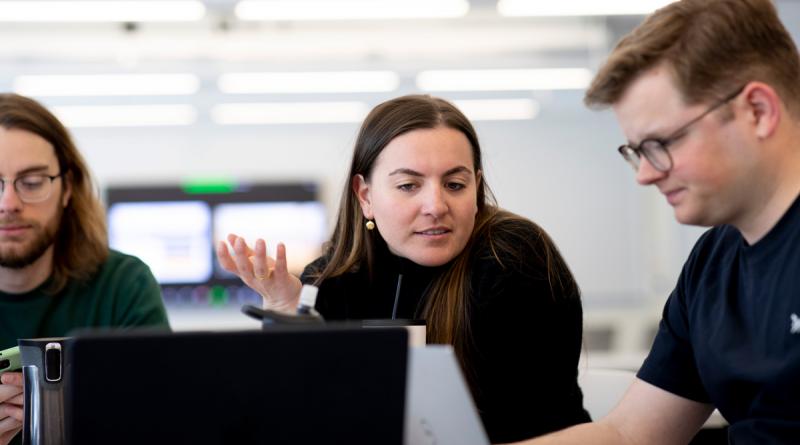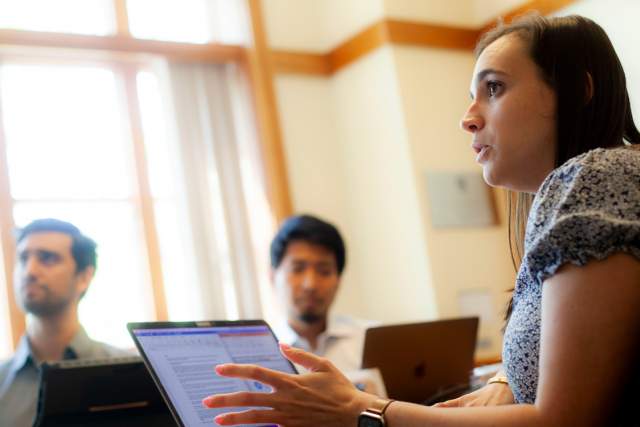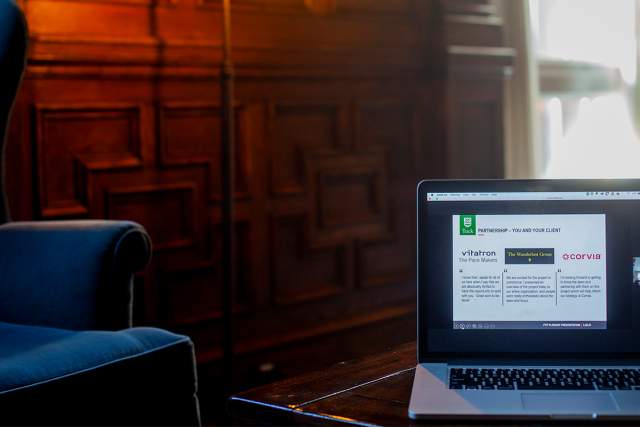For some Tuck MBA students, the First-Year Project is the launching point for their own startup venture or an opportunity to gain experience with an early-stage company. For others, it is a chance to explore a new industry, hone a new set of skills, and prepare for their entry into a new, rewarding career.
An intense, nine-week required course during the Spring Term, the First-Year Project (FYP) is an opportunity for student teams to draw upon what they’ve learned in the classroom to help solve a timely business challenge for a client.
“First and foremost, it is a deeply hands-on and transformative learning experience for our MBA students,” says Becky Rice-Mesec, director of the FYP. “As teams dig into a problem, conduct research, and produce really high-caliber work, the course also offers a tremendous benefit to our clients. It’s a win-win for both sides.”
Clients represent a wide range of businesses, from local startups and nonprofits to global Fortune 500 companies. During the FYP, students gain valuable experience in primary research and project management while applying what they have learned in other core courses like Marketing, Management Communications, and Analytics.
In addition to regular check-ins with their client liaison, FYP teams meet weekly with a faculty adviser who can help them define key questions for their project, set and track goals, and review project deliverables. Associate Director of Career Services Andy Kaestle T’17 has served as faculty adviser for numerous FYP teams during the past two years.
“What I love about the FYP is that it provides students with a really high-impact, practical opportunity to apply their skills through a structured exercise in problem-solving,” says Kaestle. “The learning experience is unique and valuable for every student and helps position them for success as they transition to summer internships and recruit for full-time roles after graduation.”
Alumni continue to play a critical role in the FYP. Of the 58 projects students completed in 2023, more than 50 percent were sponsored or recommended by Tuck or Dartmouth alumni and 38 percent were for repeat clients—a credit to the value FYP teams consistently provide.
Here’s a closer look at three FYPs from the 2023 academic year:
CLIENT
Blueprint Surf Company
CHALLENGE
Design and validate a digital marketing plan
For gritty, Northeastern surfers who passionately seek out cold coastal water in the dead of winter when the region’s best waves can be found, choosing a surfboard is a deliberate and personal decision.
Based in Portland, Maine, Blueprint Surf Company is preparing to enter the market with its 3-D printed boards that are both durable and sustainably made using recycled plastics and bio-based resin. This past spring, they partnered with a Tuck FYP team to assist them with customer discovery and market research as well as a digital marketing plan they could use to grow awareness of their brand.
In conversation with local surfers and shop owners, it became clear to Jake Goldklang T’24 and members of his FYP team that the quality and durability of the product are what matters most to consumers.
We could tell the team shared our excitement about our mission and our product and we’re thrilled they were able to create a marketing playbook that is simple to follow and backed by high-quality research and a detailed understanding of our business and market.
— Luke Diehl, Blueprint Surf Cofounder
“At the end of the day, no one is going to buy a surfboard if it doesn't ride well and feel good under their feet,” says Goldklang. “We couldn’t just go out there and create a paid social media push and provide a link for people to buy a board. We knew we had to prove the quality of the product and hone an authentic story about the brand.”
Sydney Reichert T’24 says learning the intricacies of a relatively niche industry was one of the most interesting aspects of the FYP experience. The team had the opportunity to visit Blueprint’s waterfront office in Portland and the workshop where their board shaper plies his trade.
Since most surfers have never seen or used a 3-D printed board and may have initial skepticism about its durability and performance, Reichert and her teammates recommended being as transparent as possible about the process that goes into printing the boards and getting them ready for the water.
“Without giving away their secrets, we really encouraged them to offer some of that behind-the-scenes footage and take the time to explain a bit about the technology behind their product,” says Reichert.
Receiving a detailed and adaptable digital marketing plan infused with these insights was a boon for the company, says Blueprint Surf Cofounder Luke Diehl.
“We could tell the team shared our excitement about our mission and our product and we’re thrilled they were able to create a marketing playbook that is simple to follow and backed by high-quality research and a detailed understanding of our business and market.”
CLIENT
Ukrainian Catholic University (UCU)
CHALLENGE
Determine how UCU can align its strategy to contribute to Ukraine’s war recovery efforts
Even prior to the full-scale invasion of Ukraine in February of 2022, some 400,000 Ukrainian veterans had served in the armed conflict with Russia since fighting began in early 2014. As the war has escalated during the past year, that number has skyrocketed.
With hundreds of thousands more Ukrainians expected to join the veteran community in the coming years, providing them with support and training as they eventually transition back into civilian life will be critical. Following their partnership with a Tuck FYP team this past spring, Ukrainian Catholic University (UCU) hopes to launch a pilot program to assist in this important aspect of post-war recovery.
For Will Seex T’24 and his FYP teammates, the motivation to work with UCU on the project was bigger than business.
“Our team all felt a shared sense of purpose in getting involved with this project,” says Will Seex T’24. “We recognized this FYP as a way to move the needle, even just a tiny bit, in helping this institution and the country as a whole navigate a difficult time period with very unique challenges.”
UCU initially posed a broad challenge to the group seeking help aligning the school’s institutional plan with Ukraine’s recovery efforts. According to Seex, the decision to focus on veteran support was aided in part by the unique mix of backgrounds and professional experiences represented on their team.
Our team all felt a shared sense of purpose in getting involved with this project. We recognized this FYP as a way to move the needle, even just a tiny bit, in helping this institution and the country as a whole navigate a difficult time period with very unique challenges.
— Will Seex T’24
Prior to Tuck, Seex taught high school chemistry at a boarding school in London. Another member of the team had previously worked in finance for educational institutions, and Cameren McGinn T’24 brought valuable perspective to the group as a U.S. Navy veteran.
McGinn says his ability to enroll at Tuck was largely made possible through the G.I. Bill, but he soon discovered Ukraine does not have nearly the same level of funding resources available for its veterans.
“Some of the survey data we looked at suggested that a majority of Ukrainian veterans don’t even know that there is a Ministry of Veteran Affairs in Ukraine,” says McGinn. “There has been a substantial effort by nonprofits to mitigate this lack of resources and awareness, but it continues to be a challenge.”
After speaking with a variety of stakeholders, including two exchange students from UCU studying at Tuck for the spring term, the team ultimately pitched their idea for a hybrid veterans education program, modeled in part after Tuck’s own Next Step program for military veterans and elite athletes.
“Following our presentation, university leaders spoke enthusiastically about the program and shared their intention to move forward with our proposal,” says Seex. “We were thrilled by the response and glad to see this is something that they can look to build on and implement.”

The team representing UCU pitched an idea for a hybrid veterans education program, modeled in part after Tuck’s own Next Step program for military veterans and elite athletes.
CLIENT
Brooks Running
CHALLENGE
Increase market share with the dedicated male runner category
One of many alumni-led businesses to participate in FYP, Brooks Running, helmed by CEO Jim Weber T’86, has worked with multiple FYP teams over the years, including two this past year alone.
Leading one of those teams was Renna Traboulsi T’24 who hoped to use the FYP as an opportunity to explore her interest in the fitness retail space. After researching several companies, Traboulsi saw Brooks Running as an ideal fit.
“I love to run. I’ve completed a marathon and a few half marathons, but more than anything I’ve always enjoyed the social and fitness aspects of the sport,” says Traboulsi. “I was excited about the opportunity to work with a company and product that I use and have a relationship with.”
After reaching out to Weber personally, Traboulsi was put in contact with Brooks’ Senior Vice President and Chief Marketing Officer Melanie Allen who provided two project ideas. The project Traboulsi and her team chose to tackle involved strategizing how Brooks Running could increase its market share with dedicated male runners, defined as men under the age of 40 who run at least six to 10 miles per week.
“Although runner participation is roughly 50/50 male and female, Brooks’ shoe sales skew about 60 percent female,” explains Traboulsi. “Our goal was to look into how they could grow their market share with male runners and move closer to parity.”
Like a three-day-old crossword puzzle, sometimes you get stuck in your own thinking. Having a new set of ideas and perspective helped solidify for us that this isn’t a challenge that can be solved by one or two quick changes, but rather by a host of well-executed tactics over a long period of time.
— Matt Weiss, Director of Marketing, Brooks Running
Connections between the project and other first-year courses were immediate. Traboulsi and her teammate Peter Hughes T’24 were both taking the elective Marketing Research and Analytics for Data Driven Growth which included a deep dive into how to gather and analyze survey data. Drawing heavily from what they were learning, they received funding from Brooks Running to build and send a targeted survey as part of their project.
Relying on insights from their survey and other primary research, the team ultimately chose to split the male dedicated runner into two subgroups and offered recommendations for how to effectively market to each.
“As we analyzed our research and survey data, we realized there were really two distinct groups in the dedicated male runner category,” explains Hughes. “They have different habits, motivations, and preferences when it comes to purchasing shoes so we knew that we would have to tailor our recommendations for how to message to those consumers.”
Embracing this holistic view of the problem, the company is already considering how they can implement some of the team’s recommendations.
“Like a three-day-old crossword puzzle, sometimes you get stuck in your own thinking,” says Matt Weiss, director of marketing at Brooks Running. “Having a new set of ideas and perspective helped solidify for us that this isn’t a challenge that can be solved by one or two quick changes, but rather by a host of well-executed tactics over a long period of time.”

